Double Blessings
“Do not repay evil with evil or insult with insult, but with blessing, because to this you were called so that you may inherit a blessing.” 1 Peter 3:9
Mark Batterson writes the following in his book “Double Blessing”:
“During his celebrated career as a composer, George Frideric Handel wrote 42 operas, 29 oratorios, and 120 cantatas.1
Of Handel, Ludwig van Beethoven said, “To him I bow the knee.” Handel certainly ranks as one of history’s greatest composers, but he hit a point of diminishing return later in life. At age fifty-six, Handel was past his composing prime. He was depressed. He was in debt. And a stroke hindered the use of his right hand. Handel was struggling to stay musically relevant, which is rather ironic given the fact that he was about to score one of history’s most iconic pieces of music.
On August 22, 1741, George Frideric Handel started composing. He would not leave his home for three weeks. In fact, he rarely left his composing chair.
21 days later, Handel emerged from his writing room with a 259-page masterpiece called Messiah. The opening act prophetically points to the coming Messiah.
The middle act is Handel’s commentary on the passion of Christ.
The final act celebrates the risen Savior, who “shall reign forever and ever.”
Finally Handel inked three letters on the last page, SDG—soli Deo gloria—“To God alone be the glory!”
That’s the backstory, but here’s the rest of the story. Messiah debuted as an Easter offering at the Great Music Hall in Dublin, Ireland, on April 13, 1742. The music mesmerized its listeners, but it accomplished so much more than that. It wasn’t just a concert; it was a benefit concert.
That inaugural performance raised £400—$86,000 in today’s dollars! And that £400 was used to free 142 men from debtors’ prison. That is what qualifies Messiah as a double blessing.
The first blessing is beautiful music that inspires the soul. The second blessing? Setting 142 captives free!”
The Lord blesses us for a purpose and asks us to bless others for His glory.
How can you too bless others so they may experience God’s loving grace?
“Love when you expect no love in return. Do good without expecting thanks. Lend when you do not hope for a return. This will make us act like the sons and daughters of the Most High.” – Henrietta Mears
“May God be gracious to us and bless us and make his face shine on us” – Psalm 67:1
